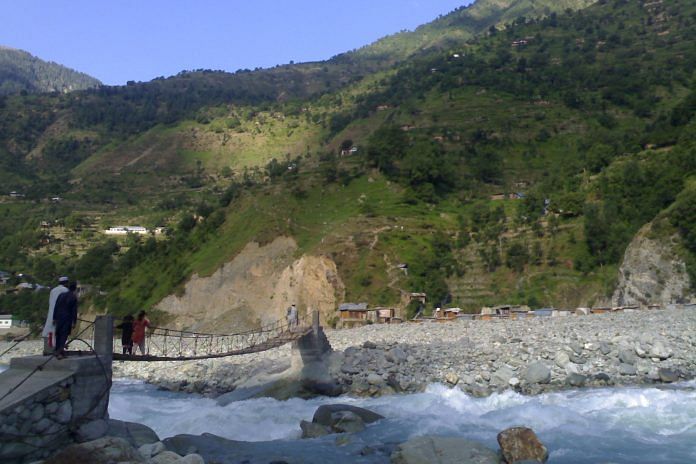As India and Pakistan mark the 70th anniversary of Partition this week, it is worth contemplating what the next 70 years may bring.
Seventy years from now, India and Pakistan will be suffering from the acute, dangerous, and deadly effects of climate change. Will this finally give the two countries an incentive to cooperate?
As India and Pakistan mark the 70th anniversary of Partition this week, there is much discussion of what has transpired over the last seven decades.
It’s also worth contemplating what the next 70 years may bring.
The questions abound: Will each country move beyond dynastic politics and patronage systems and usher in a new and more optimistic political age? Will India-Pakistan relations continue to struggle and suffer more conflict, or will we see the emergence of powerful new peace constituencies that engineer a reconciliation? Will terrorism still be a scourge? Will nuclear weapons be secure? Will China’s Belt and Road initiative make big progress in the region or fall flat? What will the Indian and Pakistani economies look like?
Speculation is a perilous science, and especially about a region as complex as South Asia. But there is one thing that can be comfortably predicted about India and Pakistan in 2087: They will be suffering from the acute, dangerous, and deadly effects of climate change.
India and Pakistan both feature dry climates, water insecurity, densely populated coastal regions, and economies heavily dependent on agriculture. Such realities make for a perfect storm of acute climate vulnerability. Little wonder that one index characterizes South Asia as both highly vulnerable to climate change and ill-prepared to deal with the impact.
Earlier this month, a Massachusetts Institute of Technology study concluded that by 2100, heat waves will be so extreme in South Asia that people could die simply by venturing outside.
This MIT study comes on the heels of a mountain of doomsday research findings about future climate change effects in India and Pakistan.
The predictions are downright terrifying. About half of Pakistan’s 200-million-strong population is deemed vulnerable to climate change-related disasters, and rising temperatures could cut rice yields by nearly 20 percent by 2080. As for India, nearly 40 million people could die from rising sea levels as early as 2050—and higher temperatures could decrease agricultural productivity by a whopping 40 percent by 2080.
Sadly, there’s good reason to believe that such prognostications will come true. After all, the effects of climate change are already readily apparent on the Subcontinent. The last few years have brought rapid glacial melt in the Himalayas, record-breaking temperatures and rain, severe drought, and catastrophic floods. While India and Pakistan are seized of the climate change threat and have implemented modest mitigation measures (particularly in the form of increasing investments in clean energy), both continue to pursue climate change-enabling policies—from the heavy consumption of coal (in India’s case) to rapid deforestation (in Pakistan’s case).
Acute climate change vulnerability will exacerbate existing hardships—such as the precarious plight of impoverished Indian farmers burdened by debt and drought. It will also raise the risk of utter catastrophe. Imagine if a nuclear power plant in the coastal megacity of Karachi—there is currently one main facility there and it is being expanded—is hit by a cyclone. Releases of deadly radioactivity could immediately imperil the lives of the city’s many million residents.
The implications of all this for India-Pakistan relations are troubling. For the past 70 years, bilateral tensions have been fueled by territorial disputes and terrorism. Over the next 70 years, the triggers for tensions could increasingly be climate and natural resources—and especially water.
The Indus Waters Treaty, which was ratified back in 1960, has helped avert a water war. But as water shortages—already acute in some parts of India and many regions of Pakistan today—become outright scarcities in the coming decades, the stakes will rise. The Pakistani terror group Lashkar-e-Taiba frequently accuses upstream India of “stealing” water.
Fortunately, there’s a potential silver lining. Perhaps, faced with the shared and arguably existential threat of climate change, India and Pakistan will conclude they finally have an incentive to work together. Such cooperation could take the form of transferring clean energy technologies and sharing data on river flows from the waters of the Indus River (what’s left of it, that is) and its tributaries. It could also involve coordinating humanitarian responses to inevitable and ever-more-destructive natural disasters. The South Asian Association for Regional Cooperation, or SAARC—if it still exists decades down the road—would provide a useful platform for institutionalizing such cooperation.
Is this too much to hope for? Perhaps. Still, given the unprecedented climate change challenges that will confront both countries over the next 70 years, it pays to be more sanguine about a relationship that has otherwise mostly inspired skepticism over the previous 70.
Michael Kugelman is deputy director of the Asia Program and senior associate for South Asia at the Woodrow Wilson International Center for Scholars in Washington, DC. Twitter @michaelkugelman; email: michael.kugelman@wilsoncenter.org



